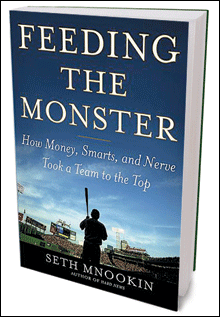So, this book came about after an article you did for Vanity Fair about the 2004 post-season?
In the period when I finished the book about the Times [Hard News: The Scandals of the New York Times and Their Meaning for an American Media], and the time when it came out, I was sort of casting around for a shortish-term assignment that was gonna leave me free to do all the promotional stuff I was gonna have to do once the Times book came out, but would keep me busy for a while. I thought, “What could be more fun than doing something on the Red Sox?”, chronicling what I hoped would be a successful playoff run. Obviously, that ended up being even a much bigger story than I could have imagined. Simultaneously, I was interviewing John Henry and Larry Lucchino and Tom Werner. I sort of felt like the story behind the sale hadn’t been covered in a sort of retrospective way. I think [the owners] also felt like the story of the sale had never been told. A project that went back that far was more intriguing to them than something that just recounted the World Series, or just recounted 2004. And since the New York Times is a minority owner, they were obviously aware I wasn’t a sportswriter, but they were familiar with [Hard News] and with what I had done. So they knew I wasn’t coming out of left field, so to speak.
How did you end up getting such unprecedented access?
When I started this [after the World Series], it was a full-time orgiastic celebration of the Red Sox. There was no real sense that the story of the team for the last four or five years was going to be anything other than what it had been, which was an unmitigated … success isn’t the right word, but an unmitigated record of achievements and accomplishments. When we worked out how the actual access was going to work, my argument was that if you really want a story that is going to portray the organization in all its fullness, then I need to be there to see all that. And that’s how we agreed on the access part. And very much to everyone in the organization’s credit, regardless of what happened during the year, they stuck with that agreement that we had made. The “key to the ballpark” sort of makes it sound like I was walking in and out of meetings and doing whatever I wanted. But that actually came about because Fenway is so old and so weird that there actually is no way to get from the clubhouse to the front offices, except going back in the stands, then outside, and needing to come back in. And eventually I think people in the organization got sick of my calling and needing them to open the door for me.

MNOOKIN ON MONSTER: "My argument was that if you really want a story that is going to portray the organization in all its fullness, then I need to be there to see all that."
|
I’ve interviewed the three owners before, and I have to admit I found Lucchino to be a fairly intimidating guy. Were some of them easier to deal with than others?
They’re all different. I think one of the reasons Larry can be intimidating is that he’s so incredibly smart. He is always sort of trying to find a new way of looking at things, and also, I think, can get impatient when he feels like there’s something that is going to be a more effective use of his time. But they were all in their own ways incredibly generous and forthcoming. Larry and I had probably the most consistently regular meetings. For a period, we were meeting at least once a week, either sitting down for an hour or making sure we had a meal together or something. He was very open about a lot of things: a lot of what had happened in the first couple years of their owning the team, a lot of what happened in his previous time in baseball. I was very surprised. Larry’s reputation in Boston is sort of the bad guy. But he probably is more sentimental about … sentimental might not be the right word, but he has a very romantic conception of baseball and baseball teams. There’s something that’s very much like a young fan in him. And if he had his way, I think every superstar would retire with the team that they came up with. That’s sort of the opposite of his reputation, which is bottom-line, cutthroat, do-whatever-we-need-to-do. So it took me a while to sort of figure out where I stood with all of them. John is someone who, right off the bat, is incredibly warm and open with a lot of people, and not intimidating. Although I later found ways in which he was intimidating to me, in terms of his incisive ability to analyze a situation. Tom, I think, also spoke very openly about the difficulties he had in San Diego [owning the Padres]. By the end of the year, I found that I was pretty comfortable with all three of them, and had worked out my own relationship with all three of them.
ADVERTISEMENT
 |